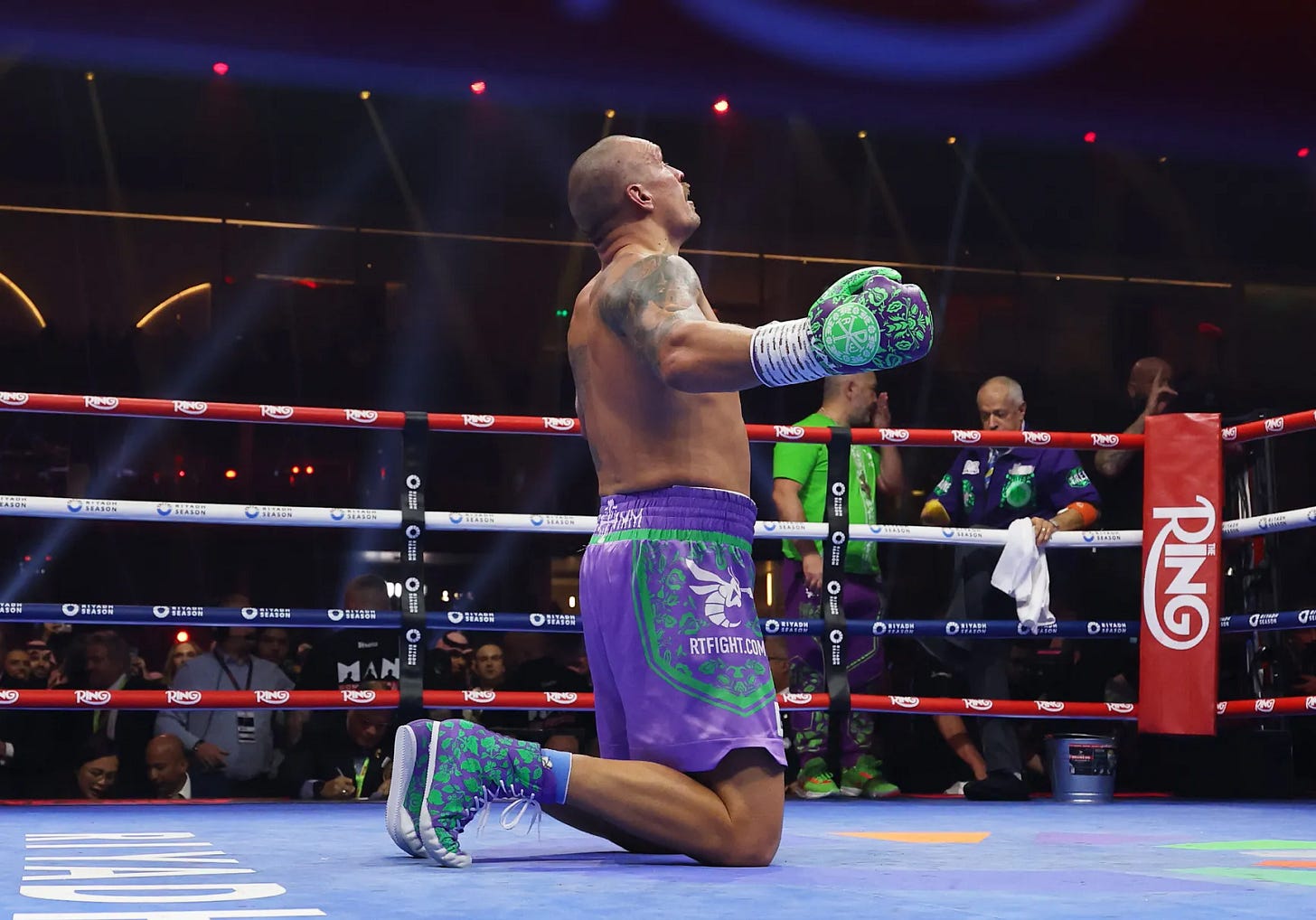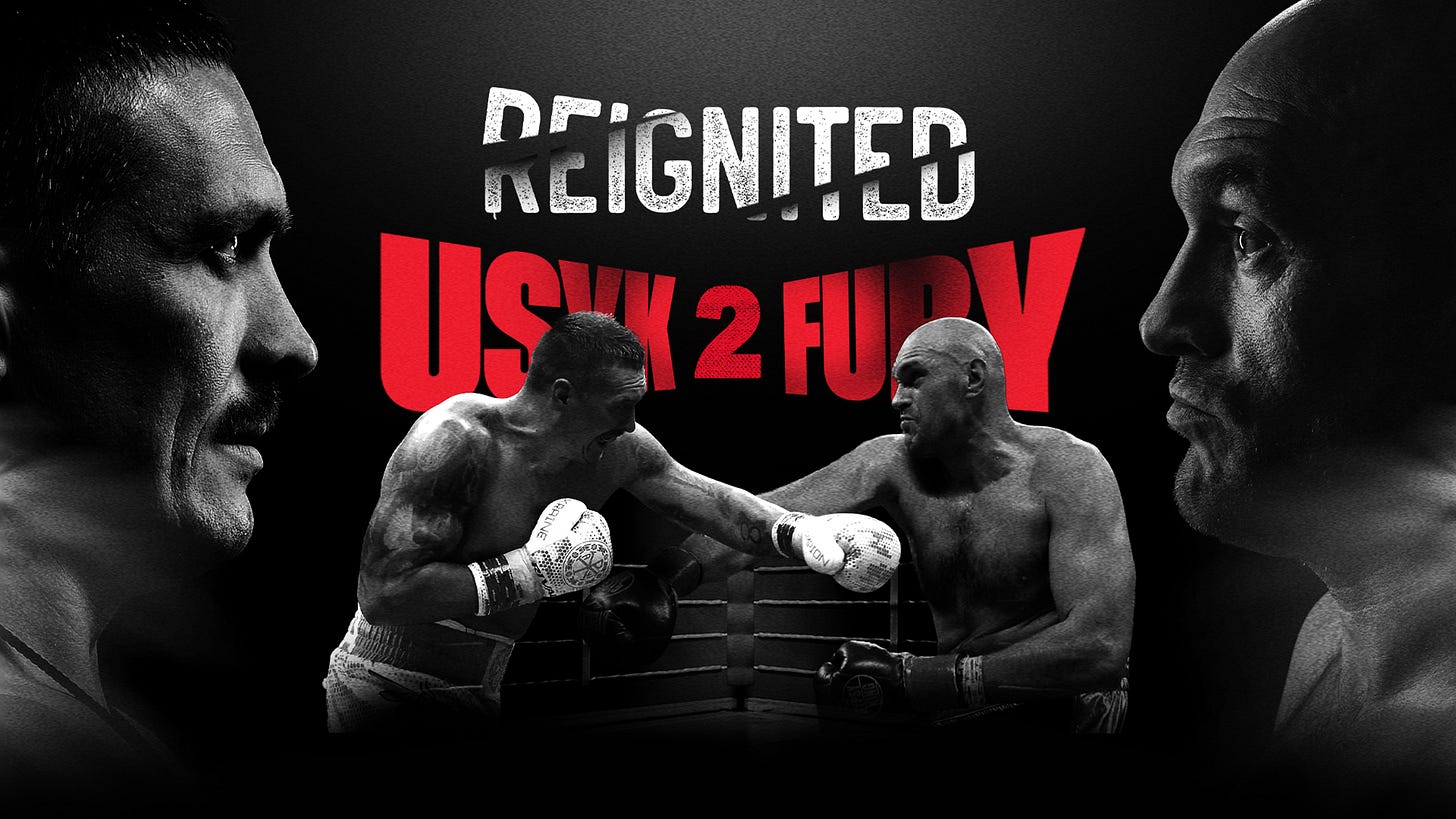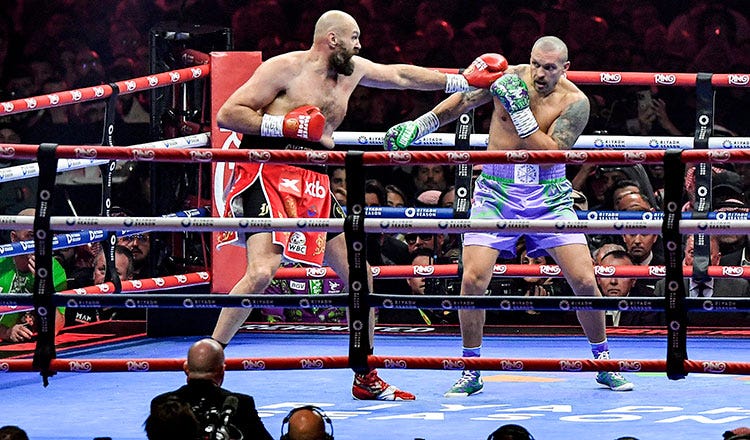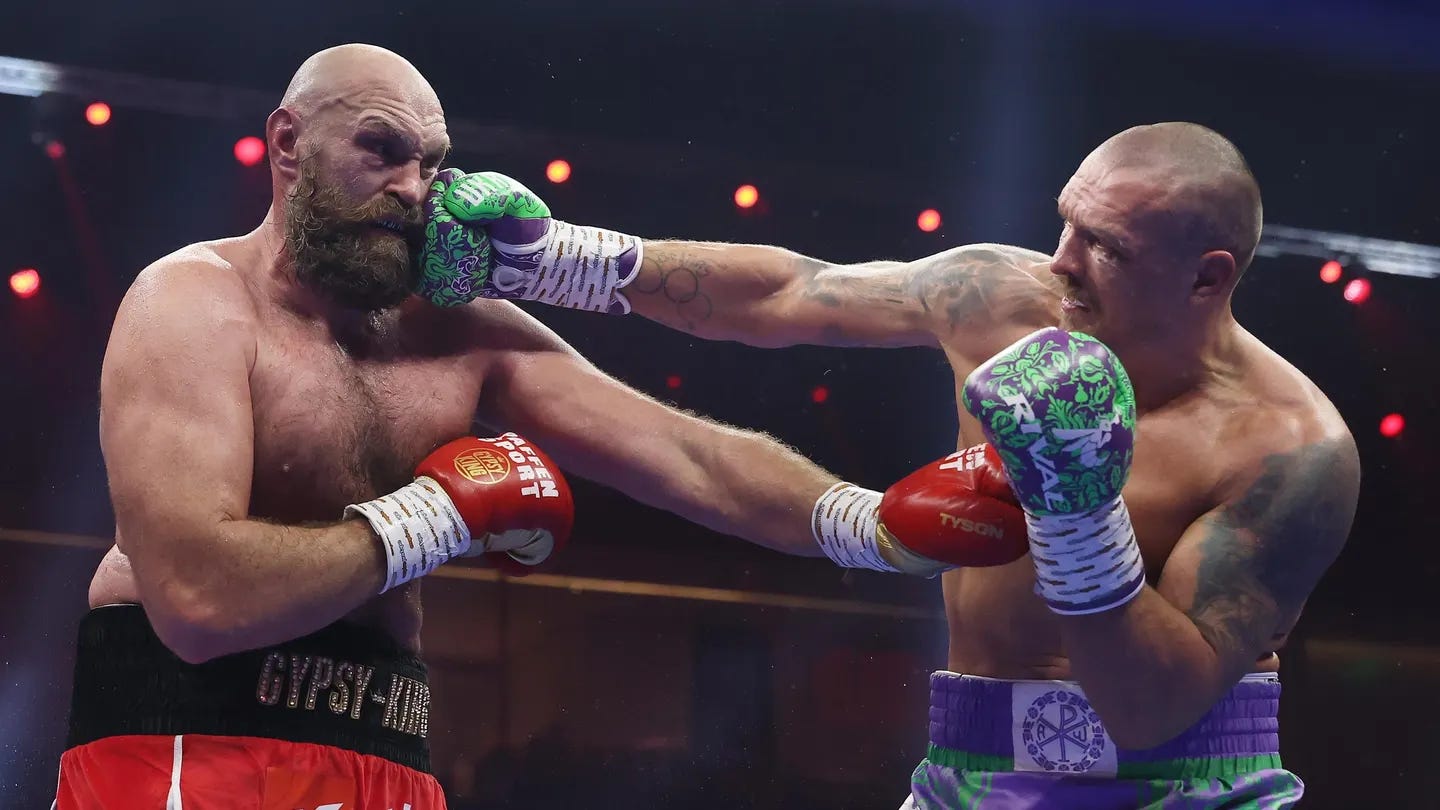Never mind the fight, let’s talk about the lesson here for a moment.
Yes, somewhere in the story of Oleksandr Usyk’s career is a lesson for us all. I wish I could sum it up with ease, but the fact is, boxing fans aren’t used to fighters who do so much and say so little. If boxing really was show business, the ‘show, don’t tell’ rule might apply more often to its stars. It takes a supernova to turn heads away from the noise and force us to rethink the definition of a champion.
If you’ve followed Usyk’s boxing career to date, you’ll have noticed that this man wins. Unbeaten at professional level, he fought 350 bouts as an amateur, racking up 335 wins and 15 losses, 11 of which he later rematched, and won. But you’ll probably have noticed something else, too. Every time Usyk wins, someone else is hot on his heels to take up airtime – either someone he has just beaten, or seen off before.
We saw this with Anthony Joshua in Jeddah in 2022. We saw it again after the announcement of Usyk’s first victory over Tyson Fury in May. And we saw it last Saturday in Riyadh, when no sooner had Usyk’s second win over Fury been declared than Daniel Dubois was seen wading into the ring to accost Usyk for “the robbery” in Poland a year earlier.
Such moments irk his fans, and were it that Usyk put any stock in words, they might irk him too. But there is no disrespecting someone who doesn’t need your respect to begin with. And this might be the first lesson Usyk has taught us: that in our age of algorithmically optimised status anxiety, it pays to be impervious to insult or flattery.
The Fight
I was fortunate enough to see Reignited firsthand, on the floor of The Kingdom Arena in Riyadh, Saudi Arabia.
There I sat at the opening bell of the main event, listening to the roar of the Ukrainian contingent as they belted out their champion’s name. I heard Ukrainian women from all sides of the arena screaming for their man in the ring, and for the men fighting back home. Their voices were by far the loudest that night. Then there was the nervous anticipation of everyone who sat waiting for the jerky friction between Fury and Usyk to combust into the fiery brawl we’d all been sold.
Before the rematch, Fury had promised fans “a lot of damage” and “a lot of pain”. He said he would serve Usyk to Turki Alalshikh like “a rabbit in a pot”, and had vowed to “knock the motherfucker out”.
But he never quite managed this. Defensively tighter than the first clash yet still intent on outboxing Usyk, Fury looked alarmingly pensive. He had begun his ring walk as The Gypsy King to the tune of Mariah Carey's All I Want for Christmas, but by the end of the fifth round, you wondered what it was he really did want. Was going for the knockout ever part of his plan? Did Fury truly believe he could get the win on points? Or, was he simply afraid that rolling the dice might open him up to the kind of shot that had sent him into a tailspin in the ninth round of the first bout?
Fury certainly didn’t want to relive that moment, and though he made sure to avoid it this time, one suspects it dominated his thinking throughout the fight. He had come into the fight weighing 281lbs, almost two stone heavier than the first dance, and had grown a full, dark beard. Many took these as signs Fury would lean into the beast within come round 13. It now seems likely Fury just wanted to keep his legs under him, no matter what Usyk threw.
And Usyk? Usyk did what Usyk does.
He applied maximum pressure to Fury, creating every opportunity to score unambiguously before the judges. Once those opportunities were set (and there were many of them), he leapt to it with darting speed before covering up to block or slip Fury’s counterattacks. True to his word in the run-up to both fights, Usyk never left Fury alone.
The longer the rematch wore on, the more audible the frustration of the English spectators grew.
Somewhere in the fourth round, an unmistakably Geordie lad piped up behind us.
“Just fooking hit him Tyson!”
Then, in round five: “Fooking just hit him, Tyson!”
Then again in the sixth: “Tyson, just fooking hit him!”
And then finally, in the closing seconds of round eight: “Do you need this gift wrapped or something? Fook me!”
By the ninth round, the Geordie had given up, and I and everyone else could sense that Fury’s chance to take control of the fight had come and gone.
Twelve rounds eventually passed by without a single knockdown or foul. All three judges scored the fight 116-112 in Usyk's favour, giving him eight rounds to Fury’s four. An AI judge introduced by Alalshikh as an experimental layer of intrigue to the analysis scored it 118-112 to Usyk.
Those who feared the officials would confect a draw to force a trilogy fight could not have been more wrong. Those who predicted Usyk would win again, and more convincingly than the first fight, left the arena that night vindicated.
When the winner was announced, Fury shook his head and left the ring speechless for the first time in his career. There would be no calling Usyk a “bug-eyed rabbit”, nor would Fury praise his Lord and Saviour Jesus Christ that morning of the 22nd day of Christmas. For the first time, actions spoke louder than words from both men.
Dubois seized the moment to climb through the ropes and deliver his call-out to Usyk. Gaunt and bloodshot, Usyk seemed disappointed that the opponent he’d grown fond of calling his “Greedy Belly friend” had left without saying a word. As Dubois cheerily made his challenge, Usyk looked like a man who had hoped to leave work on time before being waylaid by an eager junior colleague. He then took the microphone for himself.
“No problem. Your Excellency, make me fight Daniel Dubois. Thank you so much.”
And with that, the last embers of Reignited were snuffed out.
Later at the press conferences, Fury would tell reporters that Usyk had been handed a “Christmas gift”. He doubled down on the claim that he had won both fights, and that only a knockout would have convinced the judges. But he did not say why he could not stop Usyk, and nor did anyone ask.
Usyk said his victory was a gift only God could have given.
“If Tyson say it’s Christmas gift, okay. Thank you God. Not Tyson. Thank you God.”
Even as he plucked yet another win, Usyk refused to revel in the moment. From his demeanour, you wouldn’t know that he had finally come to the end of the road.
The more you go back and listen to Usyk after his fights, the more you get the feeling that victory sits about as well with him as a wooden horse outside the gates of Troy. Asked if there was a fighter from any generation he thought could beat him, he replied:
“Yes. Oleksandr Usyk.”
The Love
Boxers struggle to know what to do about Usyk. The rest of us struggle to know what to say about him. The most common and perfunctory praise you'll read online is: “You can’t not love this guy”. Scroll through the comments to any of his interviews, and you’ll find some variation of it there.
Another one you’ll see is about Usyk “The People’s Champ”. While there’s no denying him this at home, Usyk is now more than a champion of the Ukrainian cause. He has become the champion of the quiet and the diligent, of the unendowed and unsung. He is the champion of those who never fail to fulfil their duties, and never ask for much in return.
He is also the champion of a kind of happiness men in particular struggle to attain, and are known to go searching for in all the wrong places and personalities. Today’s lost boys would do better to watch videos of Usyk dancing in the gym than listen to another word spoken by Andrew Tate.
The lesson for them is this: be more like Usyk – find a way to win in life that leaves others no choice but to love you, and you them.
Without Usyk in the sport, fans of boxing would be left in thrall to blowhards and con men who’d have them forget what their mothers taught them, and only talk of humility or gratitude when it buffed their image. In beating all the heavies and their hype men, Usyk has pushed back a tide of toxic bullshit artistry in boxing. Lord knows we could use a similar force in other institutions.
After defeating Joshua in 2021, Usyk said he wanted to take his kids to school and plant trees. After defeating Fury in May this year, he spoke of saying goodbye to his late father’s ghost. Last Saturday, he spoke again of wanting to sit in the quiet of his home, and watch things grow. His actions have never betrayed these words, just as his words have never substituted action.
Usyk ends the year nearly 38 years-old, with 22 wins and zero losses to his name as a pro. Twenty-three, if you count the argument about cruiserweights in the super-heavyweight era. A whole lot more than that even, if you count the respect of all those who once doubted him.
His disregard for his own greatness feels deeply alien to us in the 21st century, yet Usyk has proven it possible to win belts, hearts and minds on precisely that platform.
It’s not the weight of those belts, nor that of any trophies, merchandise deals or real estate investments, that makes Usyk a champion. His money, for all he cares to show for it, might as well amount to less than six figures. What excites people’s love for this man is the scale of what he has achieved without ever once resorting to insult, or seeking to control or alter the narratives and events surrounding his path to the summit.
Usyk is not just the smallest heavyweight of his generation. He is the lightest man on Earth.





